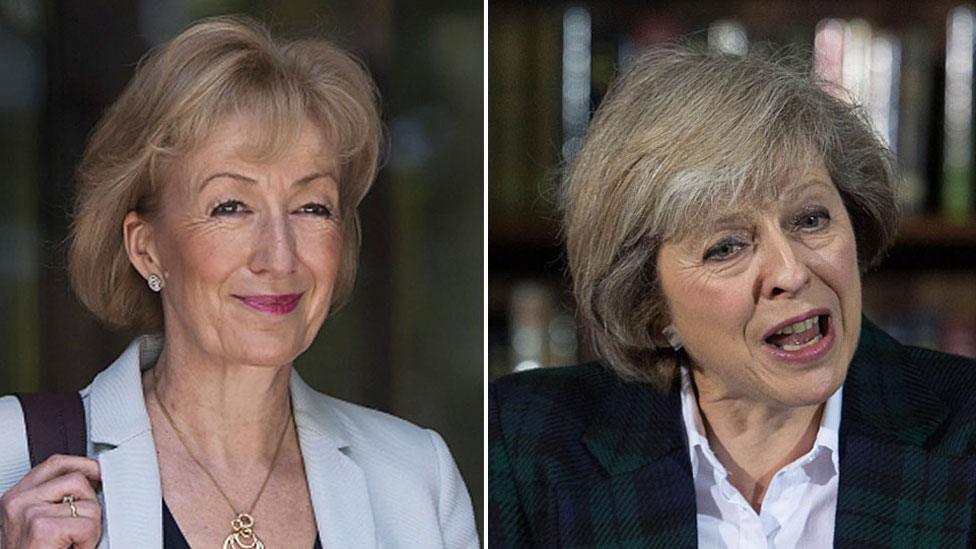Are women taking over British politics?
- Published
John Piennar reports on the background and aspirations of the two contenders
With Britain set to get its second woman prime minister, has the boys' club that has dominated British politics for centuries finally had its day?
Remember that group hug? When SNP leader and Scottish First Minister Nicola Sturgeon, Plaid Cymru's Leanne Wood and Green Party leader Natalie Bennett got together at the end of one of the general election TV debates, leaving poor Ed Miliband flapping about on the sidelines.
That felt, to some, like a moment when things were changing for women in British politics.
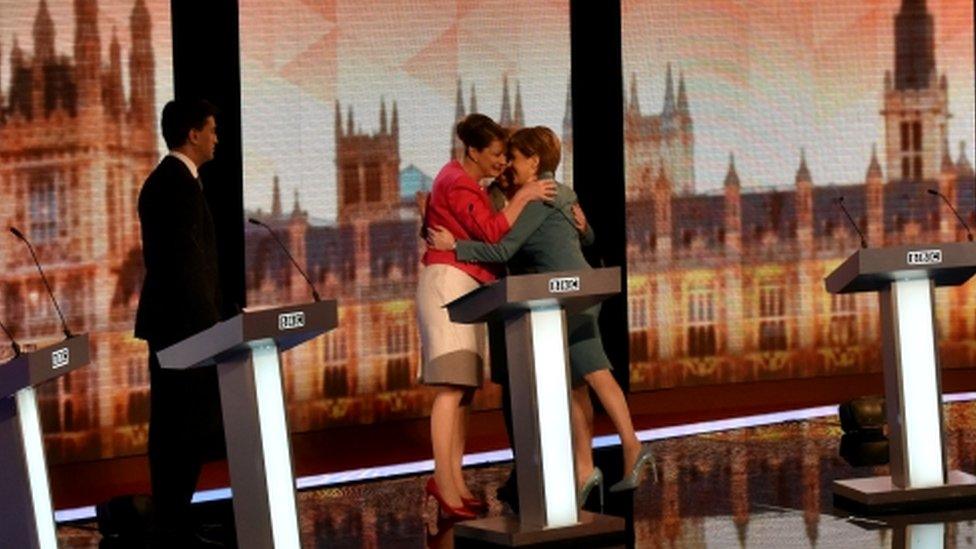
The impressive performance of female politicians, such as Andrea Leadsom and Scottish Tory leader Ruth Davidson in the EU referendum TV debates, felt like another.
Now, with Mrs Leadsom and Theresa May battling it out for the Tory leadership we are on the verge of getting our second female prime minister, 26 years after Margaret Thatcher left Downing Street.
On the global stage, America could be about to get its first female president, in Hillary Clinton, and German Chancellor Angela Merkel continues to dominate European politics.
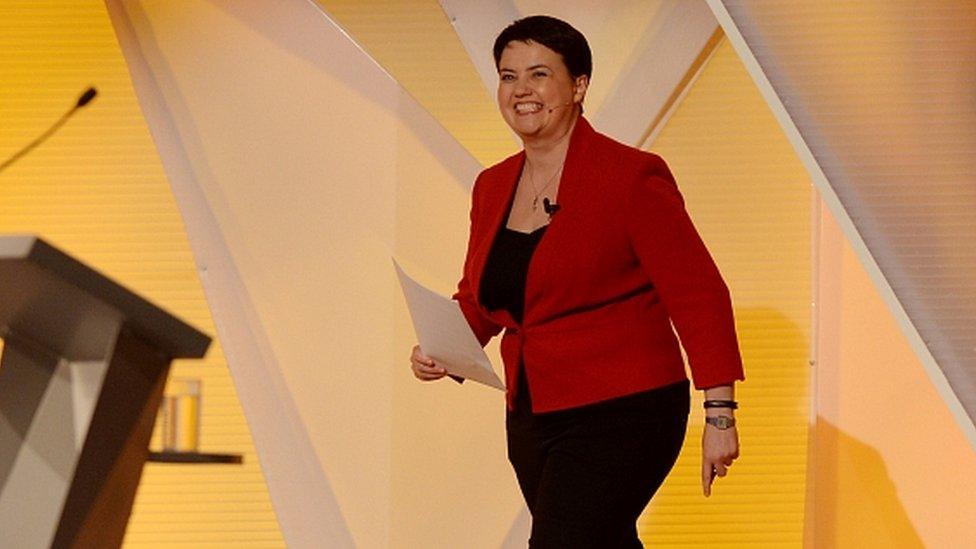
Scottish Tory leader Ruth Davidson burst on to the national scene during the EU referendum
Democratic Unionist Party leader Arlene Foster is the first woman to be First Minister in Northern Ireland and Ms Sturgeon continues to dominate things at Holyrood.
Labour might even get a female leader for the first time in its history, if Angela Eagle decides to launch a challenge against Jeremy Corbyn.
And if UKIP elects one of its high-profile spokeswomen, such as Diane James or Suzanne Evans, to replace Nigel Farage, and the Greens opt for another female leader we could be in a situation where the majority of Britain's political leaders are women, for the first time ever.
But have things really changed for women in British politics - or is it all just a historical accident?

No quota? No problem
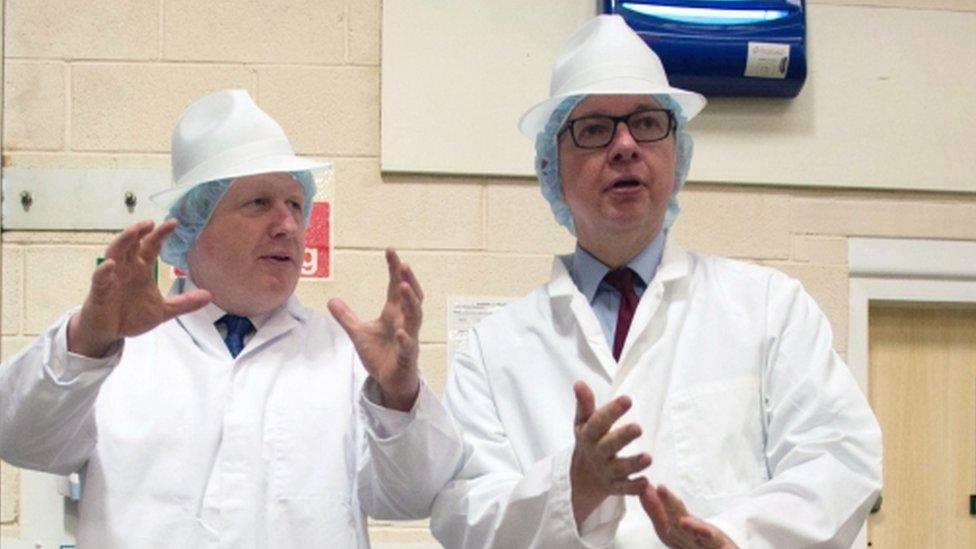
Boris Johnson and Michael Gove: Power games ended in disaster
Many Conservative MPs love the idea that they are going to get a second female leader. What pleases them more than anything is that Labour, for all its hand-wringing about gender equality, and its women-only shortlists, has never managed to have one.
The Conservatives, in their practical, common-sense way have simply got on with it, they say.
Tim Montgomerie, Times journalist and former Tory insider, argued on the BBC's Newsnight that the fact that the party does not have a quota system, and women have to compete on equal terms with men for seats and influence, has created better, tougher politicians.
Critics argue that party has arrived at an all-women shortlist to choose its next leader almost by accident, after the public schoolboy power games of the alpha males in the contest, Boris Johnson and Michael Gove, ended in predictable disaster.
Which is a victory, of sorts, for female level-headedness and common sense.
In fact, there have been efforts going on behind the scenes for years in the Conservative Party, to mentor talented women and get them into winnable seats, through organisations like Conservative Women and Women2Win.
David Cameron - who has taken his share of stick for having a "problem" with putting women in top cabinet jobs - has overseen a huge increase in female Tory MPs, from an admittedly low base.
Ten years ago there were just 17 female Tory MPs, now there are 68.

Thatcher the empowerer?
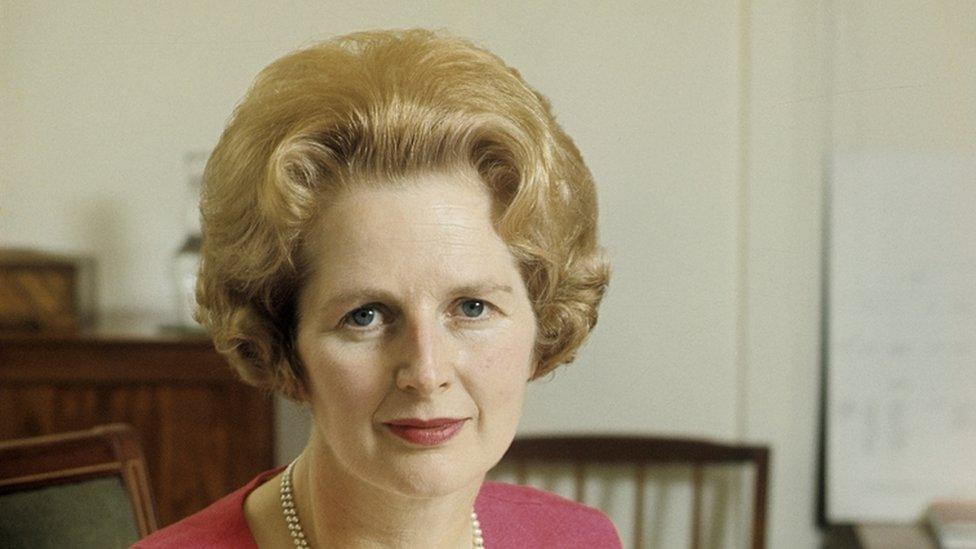
Many believe that Margaret Thatcher broke down barriers for Tory women
Margaret Thatcher, who made history in 1979 by becoming Britain's first female prime minister, liked to surround herself with powerful, charismatic men.
Some have called it the Queen Bee syndrome - the tendency of women in positions of authority to be more critical of subordinates who are also women.
She was once asked why she did not have more women in her cabinet. Because they are all so useless, she is reported to have said.
But there is no doubt that a generation of Conservative women, from cabinet members right down to members of the tiniest parish council, have looked to Thatcher as a role model.
More importantly, the party itself, once the very bastion of male privilege and entitlement, is entirely comfortable with the idea of a woman at the helm.
Imagine the endless, tedious questions about whether the party and the country was "ready" for a female leader, that would have attended the run-off between Leadsom and May, had Thatcher not been there first.
She went through all of that in her leadership contest in 1975, so they don't have to.
Left-wing critics may claim she did little to advance the cause of gender equality in British society during her 11 years in power but Thatcher did break down barriers for women in politics, whether she had intended to or not.

Labour's women
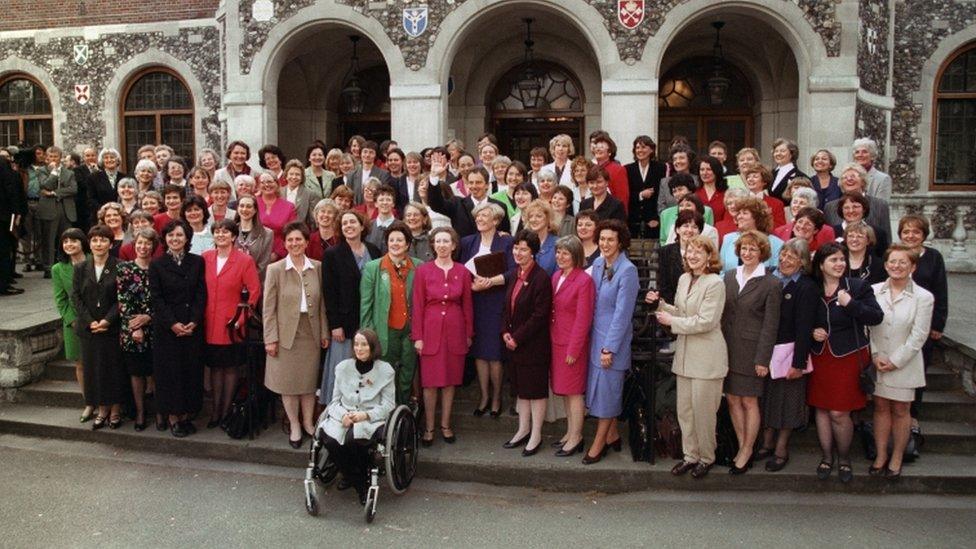
Labour had 101 women MPs in the 1997 Parliament
It is a profound source of embarrassment to Labour that they have never had a female leader.
Harriet Harman and Margaret Beckett have both kept the seat warm between permanent male leaders, but there has never been a Labour Thatcher.
The macho culture of the old, industrial trade unions has been blamed by some for a lingering, subliminal sexism at the top of the party.
Others say the rise of "identity politics" - treating women as a special interest group rather than as individuals - has had the opposite effect to the one intended. Listening to Old Labour figures muttering about the "sisterhood" would lend weight to that argument.
Miranda Green, a former senior Lib Dem aide, told the BBC's Daily Politics that Labour women tended to dismiss Conservative women such as Theresa May and Andrea Leadsom because they "don't fit their idea of a feminist," when they should be celebrating them.
But, she added, Labour has at least put the structures in place to get more women into positions where they can challenge for ultimate power.
Tony Blair's controversial adoption of all-women shortlists, resulted in the biggest single influx of women MPs into Parliament in its history, permanently changing the character of the place.
And Labour can, at least, console itself, that Ms Green's party, the Liberal Democrats, probably have the worst record of female representation in Parliament of any of the major parties.

So how much has changed?
It is easy to see the recent rise of women in British politics as a watershed moment - but we should not get ahead of ourselves.
Women are still massively under-represented in politics, and the barriers preventing them from reaching the top, in public life and business as much as in politics, are arguably just as high as they have ever been. They are just in a different place.
Strong women are labelled shrill and pushy. The media focuses on their personal grooming and fashion sense in a way that would never happen to their male counterparts.
And despite all the warm words from male leaders the formal, and informal, party structures can still militate against women getting to the top.
But none of that need worry Theresa May or Andrea Leadsom, who have made it through the obstacle course - and can now dream of walking through the doors of Number 10 in early September on their own terms.
- Published8 July 2016
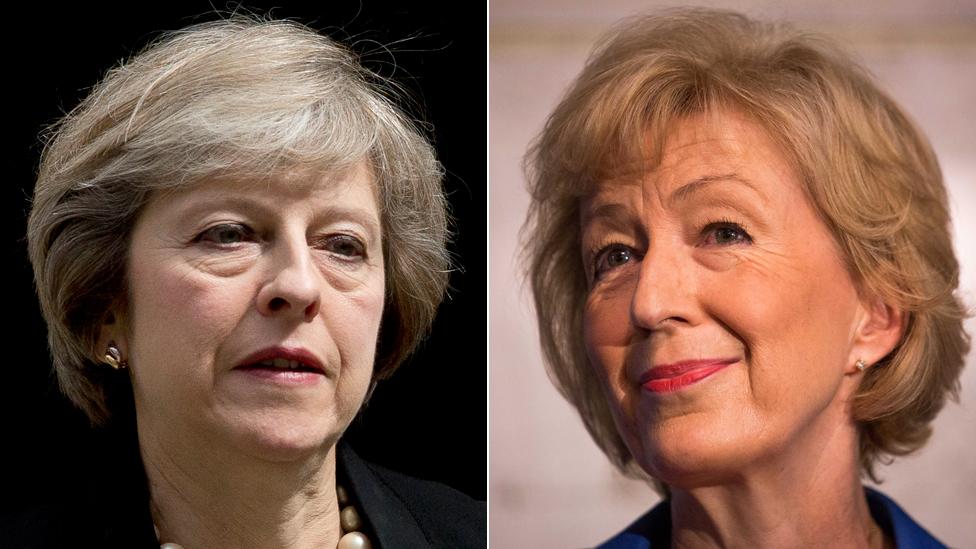
- Published7 July 2016
